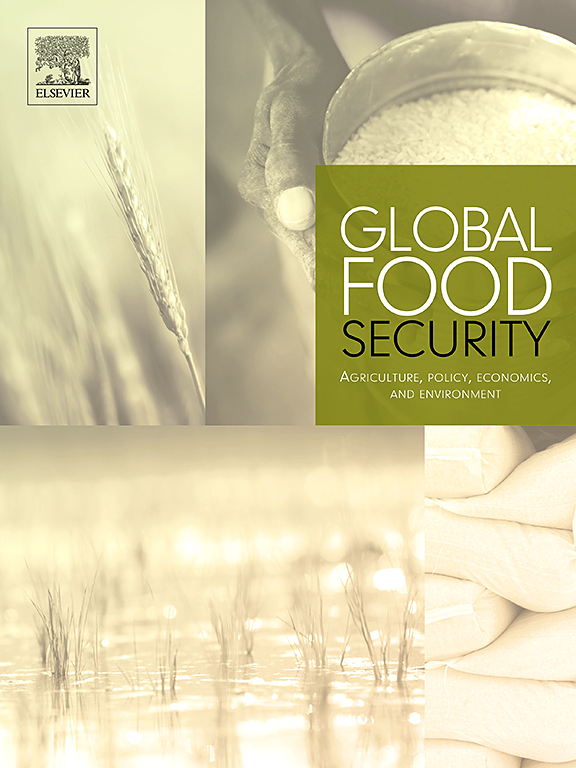Closing the gender gap in global food insecurity: Socioeconomic determinants and economic gains in the aftermath of COVID-19
IF 9.6
1区 经济学
Q1 FOOD SCIENCE & TECHNOLOGY
Global Food Security-Agriculture Policy Economics and Environment
Pub Date : 2025-04-08
DOI:10.1016/j.gfs.2025.100850
引用次数: 0
Abstract
This study examines the socio-economic determinants of the gender gap in global food insecurity, analyzing data from 792,000 individuals across 137 countries, between 2014 and 2022. The findings reveal that women are consistently more likely than men to experience food insecurity, even after controlling for income, employment, education, and other factors. Moreover women, rural areas and younger adults, particularly those aged 15–24 and 25–34, have been disproportionately affected by the COVID-19 pandemic. A macro-level analysis estimates that closing gender gaps in farm productivity and wages in agrifood systems could increase global GDP by nearly USD 1 trillion and reduce food insecurity for around 45 million people. At the micro-level, eliminating gender disparities in education, income, and labour-force participation could close 52 percent of the gender gap in food insecurity, with the remaining gap driven structural inequalities and discriminatory gender norms. These findings underscore the urgent need for gender-responsive policies to achieve the Sustainable Development Goal 2 on Zero Hunger.
缩小全球粮食不安全中的性别差距:2019冠状病毒病后的社会经济决定因素和经济收益
本研究分析了2014年至2022年137个国家79.2万人的数据,探讨了全球粮食不安全中性别差距的社会经济决定因素。调查结果显示,即使在控制了收入、就业、教育和其他因素之后,女性始终比男性更有可能经历粮食不安全。此外,妇女、农村地区和年轻人,特别是15-24岁和25-34岁的年轻人,受到COVID-19大流行的影响尤为严重。一项宏观层面的分析估计,缩小农业粮食系统中农业生产力和工资方面的性别差距可以使全球GDP增加近1万亿美元,并减少约4500万人的粮食不安全状况。在微观层面,消除教育、收入和劳动力参与方面的性别差异可以消除粮食不安全中52%的性别差距,其余的差距则是由结构性不平等和歧视性性别规范造成的。这些调查结果强调,迫切需要制定促进性别平等的政策,以实现关于零饥饿的可持续发展目标2。
本文章由计算机程序翻译,如有差异,请以英文原文为准。
求助全文
约1分钟内获得全文
求助全文
来源期刊

Global Food Security-Agriculture Policy Economics and Environment
FOOD SCIENCE & TECHNOLOGY-
CiteScore
20.90
自引率
3.40%
发文量
69
期刊介绍:
Global Food Security plays a vital role in addressing food security challenges from local to global levels. To secure food systems, it emphasizes multifaceted actions considering technological, biophysical, institutional, economic, social, and political factors. The goal is to foster food systems that meet nutritional needs, preserve the environment, support livelihoods, tackle climate change, and diminish inequalities. This journal serves as a platform for researchers, policymakers, and practitioners to access and engage with recent, diverse research and perspectives on achieving sustainable food security globally. It aspires to be an internationally recognized resource presenting cutting-edge insights in an accessible manner to a broad audience.
 求助内容:
求助内容: 应助结果提醒方式:
应助结果提醒方式:


